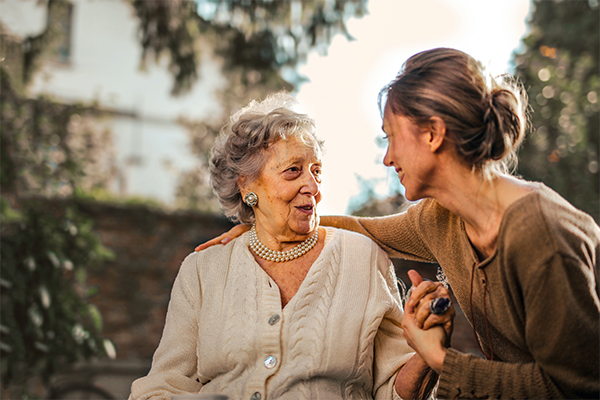
August 30, 2021
The Joys of Caring for Each Other
Whether we’re caring for our children, aging parents, or contributing to a culture of caring, compassion, and support at work, with our friends, and in our communities, caregiving is part of all of our lives. We are naturally social and compassionate beings, and research1 shows that when we are doing good deeds for others, those efforts contribute to well-being, happiness, health, and longevity, as long as we don’t become overwhelmed by our responsibilities and tasks.
There is surely an art to balancing the responsibilities of caring for others without getting too overwhelmed. A study2 of caregivers conducted by Elissa Epel and Elizabeth Blackburn showed that those who reported the least amount of perceived stress in their lives and roles not only felt the least amount of stress but also had the slowest rate of aging.
One takeaway is that the greater our perceived stress, the more of a toll it takes on our bodies, even down to the rate of aging. The good news is there are many wonderful things we can learn and apply to decrease stress. Mindfulness is one of the best resources and offers ways we can learn how to shift our experience of caregiving-related stress and its effects on the body. We can learn lifestyle habits and practices to have a more balanced and joyful experience throughout the many caregiving opportunities and responsibilities that life presents to us.
Enjoying the Present Moment While Caregiving
Mindfulness practice calls on us to pause and remember to be fully present throughout the day. It invites us to bring in the qualities of appreciation and gratitude to the many moments of the day. I will never forget the modeling of caregiving that I saw almost every day in our neighbor’s adjoining back yard. Our elderly neighbor had dementia and had the means to have caregivers around the clock. I was struck by his team, who brought their hearts to their work day after day, in their care for Edward (not his real name).
Each day without fail, they set up a beautiful picnic lunch for him at the outdoor dining table. First, the black checkered tablecloth would go on the table. Then they would bring Edward out with his walker and seat him at the table. Some of the caregivers would put on music like they were having a party. A lovely spread of food was always laid out, and they would leisurely eat and converse, even though he couldn’t retain much more than the moment in front of him. They were clearly enjoying this time in the middle of the day as much as he was.
This same simple enjoyment and appreciation of the moment were evident when I would run into him and his caregiver walking his dog. He would be carefully holding onto his walker while gently and patiently being guided by his caregiver step by step. They would both have smiles on their faces, just happy to enjoy the world around them. It felt as if they were wishing everyone well with each step.
The mindful care Edward was immersed in surely helped his naturally sunny disposition. The last time I saw Edward, he was having lunch outside with a caregiver who, not without effort, had taken him from his home hospice care bed for one of his last simple pleasures. With a big smile, projecting as much authentic warmth and kindness in my voice as possible, I said “So nice to see you here, enjoying this beautiful day outside”. He responded to me with another big smile and his usual charm, that never missed a beat:
“Nice to be seen.”
Showing Up During Caregiving with Mindfulness
Raising children is also a 24/7 job, especially in the earlier years before school. We can show up for our children as mindfully present and caring as possible, tending to our responses mindfully in difficult situations, but it is also important to acknowledge our humanness with compassion. We won’t always be able to show up that way every moment, and of course need time for rest, relaxation, and self-care, too. We can respond more skillfully when we take this time. And like the caregivers of Edward, we can make the routines and rituals of daily life with our children special, filled with joy.
As “givers of care”, whatever this means for each person, whether offering a kind gesture or helping hand, taking care of our children, or being an actual caregiver, we can practice being mindfully present with as much care, compassion, and appreciation as possible.
We can remember and celebrate the little moments throughout the day that can make this possible. We can create magical moments out of seemingly ordinary ones. It makes a big difference in our own health, well-being, and energy level, and in the ones “being seen” – creating more joy for everyone.
Written by Andrea Lieberstein, MPH, RDN, CMT-P
References:
- Post S. G. (2005). Altuism, happiness, and health: it’s good to be good. International journal of behavioral medicine, 12(2), 66–77. https://doi.org/10.1207/s15327558ijbm1202_4
- Epel, E. S., Blackburn, E. H., Lin, J., Dhabhar, F. S., Adler, N. E., Morrow, J. D., & Cawthon, R. M. (2004). Accelerated telomere shortening in response to life stress. Proceedings of the National Academy of Sciences of the United States of America, 101(49), 17312–17315. https://doi.org/10.1073/pnas.0407162101